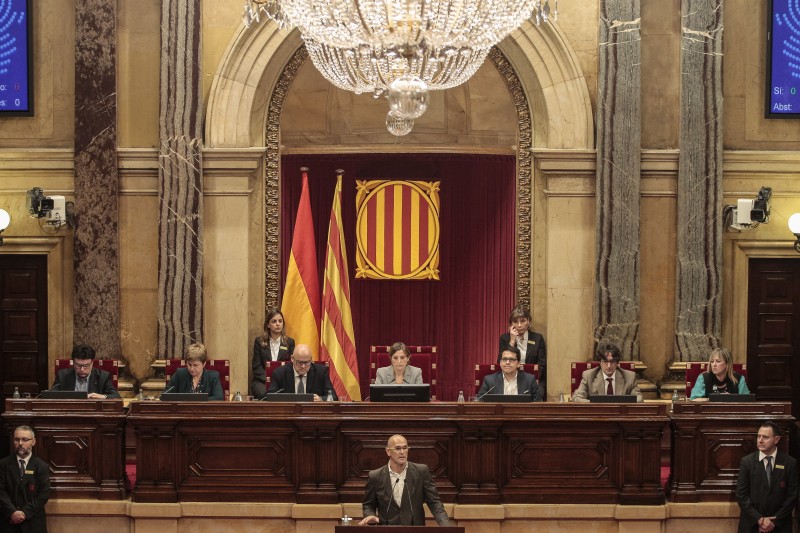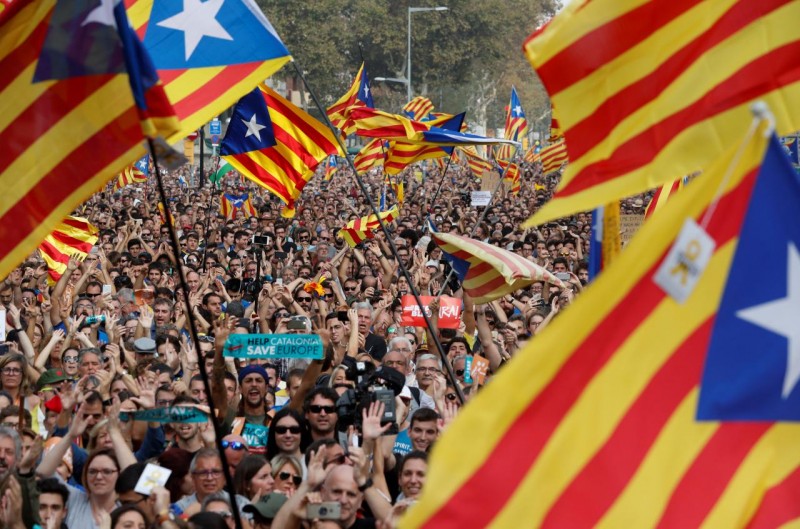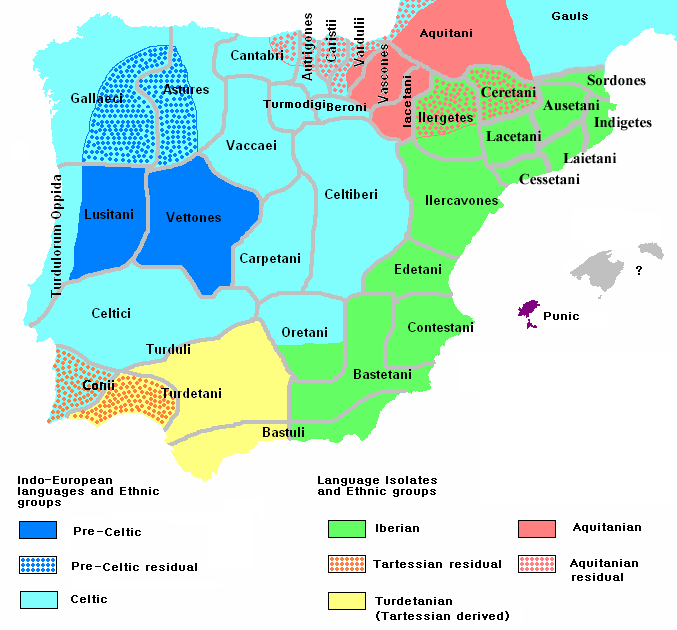|
So what are we to make of the crisis in Catalonia?  Momentous events have come to pass this afternoon, finally, in Barcelona, namely that the Catalan Parliament has voted to declare independence from Madrid, and just 40 minutes later Madrid has voted to furnish Mariano Rajoy with the power to invoke Article 155 of the Spanish constitution, suspending Catalan autonomy. I think it is time for us to acknowledge this development and ask, if only via this brief (and rapidly written) post, what it means. There has been much written over the last few weeks about the conflicted state of Catalan opinion, and many claims about the (supposedly) indistinguishable and unified Spanish ethnic type, and consequently about the negative and materialistic motives of Catalans in escaping the tax-hungry Spanish regions to the south and west. To many of us it is self-evident that Spain is not just a state but a nation – we have all grown up with that belief – and the suddenness with which this whole crisis has exploded into our consciousness seems scarcely credible. After all, Yugoslavia was never a real country, and once the Berlin Wall was down it was fully expected that fracture would occur, and that fracture might be accompanied by violence. But this … this is happening in the liberal west of the continent to a key member of the EU, a member of NATO, a modern, industrialised democracy. According to the customary assumptions about the liberal democratic model, it shouldn’t even be possible. On the other hand, there is an undeniably ugly side to the Spanish government’s reaction to the events in Barcelona thus far. It is patently obvious that there is no interest in trying to talk down the secessionists. The Spanish regions enjoy maximum autonomy already. There is nothing more to give in that direction. The political possibilities for negotiation have been stripped bare. All that remains is core principle and force, which express differently in each side. This is, then, a classic contest between a genuine identitarian will, which cannot be satisfied with any amount of autonomy within another governing system, and the existential necessity of that system to maintain its integrity. Well, we are ethnic nationalists. In such a battle, our guide to what is right is not romantic and sentimental and not predicated on an overriding desire for peace. We must favour what is most permanent and dear, and that is authentic peoplehood and identity. The Catalans have it. There are distinct genetic components in the people, stemming from a German influence which is seen nowhere else in the Iberian peninsula. They have a language and a particular culture and history, and they have a pride in that. These things are great givers of a courage which, on the surface anyway, looks as if it will not be brooked. The Catalans will face the force of the Spanish government, and probably fight back with civil unrest, for example by denying Madrid their taxes. But there is another, related and larger contest here which steers us towards supporting Catalonia. All of us in the West, and especially in the European Union, are being ushered, by degrees, into a new supra-state. It is a top-down, elite-led project, and its implications for nations, as expressions of a particular descent, belonging and loyalty, are destructive. We see this most clearly today with the attempts by the EU bureaucracy to coerce Third World migrants upon the Visegrad states.  It is true that the Catalans do not seek freedom from Brussels, and seem not to have understood (any more than the SNP government in Edinburgh did in 2014) that Brussels cannot simply extend membership of the Union to a new European state. But above and beyond the politics is the over-arching contest for and against the ethnic life. Even if it does not know it today … even if the public discourse and the political ambition remain essentially liberal and not at all nationalist in any overtly recognisable sense… Catalonia is inducting itself into this historical contest. Spain, meanwhile, in announcing its cold determination to survive, is taking its own inevitable place in the opposing camp - inevitable because post-Franco Spain, the Spain of Juan Carlos and democracy and admission to the then EC, was a project of modernisation, and modernisation, as understood in the half century after World War II, with all the bells and whistles of a brave new, subsuming openness to the world and its markets and its peoples, had no time for the introspection and the values of ethnic survival and self-preservation. Metapolitically, such modernisation always treats of ethnicity within assimilation (or melting-pot) theory, attaching no greater worth or meaning to it than a lab researcher typically attaches to lab-rats. Catalonian independence, like Brexit, like all the nationalist and near-nationalist advances in 2017, is inherently an insistence on the human worth and meaning of the ethnic life. We are bound to support the Catalans in their brave bid for freedom and true autonomy. It is our fight. Comments:2
Posted by Captainchaos on Sat, 28 Oct 2017 02:33 | # Yeah, it’s kind of hard to see what the fledgling Republic of Swarthlandia has to do with Germany. Perhaps Michael Ravioli - pontiff of swarthoidism - can set us straight. 3
Posted by Captainchaos on Sat, 28 Oct 2017 03:04 | # I want to see if I can kick GW off the fence on this one. I wonder if he would be pissed if his daughter decided to breed with a shit-skinned greaseball. Would nothing less than Nordic do in that instance? 4
Posted by Guessedworker on Sat, 28 Oct 2017 04:13 | # Rocha: Doubt me? Just check wikipedia OK, well, Wikipedia turns out to have a page on “Genetic History of the Iberian Peninsula”, and this is what it says:
https://en.wikipedia.org/wiki/Genetic_history_of_the_Iberian_Peninsula So I overlooked Galicia. My bad. 5
Posted by Guessedworker on Sat, 28 Oct 2017 04:16 | # CC, I would not want my daughter to marry any foreigner. Even a northern German. Hell, I wouldn’t be completely happy for her to marry a Scot. 6
Posted by Spain crushing Catalonian independence movement on Mon, 30 Oct 2017 18:07 | # On Friday, The Spanish Prime Minister Spanish Prime Minister Mariano Rajoy announced his Cabinet had fired Catalan President Carles Puigdemont and had dissolved Catalonia’s Parliament. The Spanish government has taken control of Catalonia, stripping the north eastern region of its autonomy, implementing direct rule in an effort to crush Catalonia’s independence movement. 7
Posted by CajunSwan on Tue, 31 Oct 2017 17:12 | # Clearly the globalists want to make an example out of this situation. Pride in nation must go. It’s in the way of their plans. 8
Posted by mancinblack on Wed, 01 Nov 2017 19:17 | # My first experience of Spain was as an eight year old in 1963. My parents having decided that we should holiday there and as was their habit that meant travelling by road. This was still very much old Europe we drove through. The motorways hadn’t been built and the continent had not yet acquired its American skyline. The architecture was old but buildings wore their age with the cloak of dignity. We passed a number of rural villages in Spain and at one such we made a brief stop in the village square and my father entered the only shop I could see, to ask directions or something. I think it was a butchers as I could see meat hanging from hooks but it was so fly blown it was hard to tell. I took the opportunity to get out of the car and stretch my legs. By this time a group of locals had gathered. I guessed they were not used to seeing strangers, especially northerners in a brand new Vauxhall. A few children accompanied the adults. They were all girls aged between four and seven I would say. The oldest smiled at me, so I smiled back at her berry coloured face which was framed by luxuriant tresses as dark as the Gates of Hades*. Yet despite this congenial atmosphere I found myself feeling a little uneasy. I had, somewhat dispassionately, noticed that none of these young girls appeared to be wearing underwear. No, it wasn’t that causing my sudden uneasiness, I had a sister after all. It was something else. You see, back in England we still had our slums, although the government was doing its best to level them and build new ones in their place. In many parts of the country people still felt safe leaving their doors unlocked as they went out because they knew there was little inside worth stealing. The poverty in front of me now was on an entirely different level. It made a lasting impression on me and not only on me but on my mother too. Even though as child she had lived through WWII and the Blitz. These people were so impoverished that I doubt they had any piss to put in a pot if they had a pot to piss in, if you follow. My unease was because for the first time in my young life I began to realize how fortunate and yes, privileged, I was by comparison. The contrast between this village and our penultimate destination, Malaga, couldn’t have been greater. It would be some years before I became aware of the reasons for this disparity in wealth. Those being the economic priorities of Franco, who had lavished money on the monarchy, the Church, Real Madrid FC and of course his own bank account. This, finally, brings me around to the question of Catalonia and its desire for secession. I can’t help but feel that there is something of the spirit of Franco about this and to me, that is the same spirit that made the English upper and middle classes turn their collective back on the white working class and basically tell them “Fuck you Jack. Globalism works for us. You are on your own”. Perhaps I’m wrong, it would hardly be for the first time, and perhaps this is a genuine outpouring of ethno nationalist sentiment. So I have to ask myself a simple question. That question would be this. If Catalonia was one of the poorest regions in Spain and say, Andalusia, one of the wealthiest, would the Catalans still be waiving their flags and demanding independence? I don’t suppose I’ll ever have an answer to that but what I do feel secure in saying is that an independent Catalonia would push the poorest in Spain further to the margins and closer to the economic abyss they have struggled so hard to crawl away from. That great poet, Federico Garcia Lorca, once wrote that “I will always be on the side of those who have nothing and are not allowed to enjoy the nothing they have in peace”. You will find me next to the green myrtle and the shade of Lorca, on this issue, I think. * “The Gates of Hades” was the name given to St Michael’s cave in Gibraltar by the ancient Greeks and was the southern most tip of this journey. 11
Posted by Catalan separatists 50/50 chance in December on Tue, 28 Nov 2017 15:38 | #
12
Posted by Ethno-nationalism wins in Catalonia on Fri, 22 Dec 2017 07:02 | # In a result not anticipated according to legacy media…
* - cross out added, should read, “integrationists.” 13
Posted by Catalonia crisis in 300 words on Fri, 22 Dec 2017 07:28 | #
14
Posted by Puigdemont on Mon, 26 Mar 2018 15:56 | #
In Catalonia, protests broke out in the streets as news came that German authorities had arrested Carles Puigdemont with the capacity to extradite him to Spain as he entered from Denmark. This comes at a time when 25 Catalonian officials are being put on trial for rebellion or disobeying the Spanish government. Post a comment:
Next entry: Farage names Soros in the European Parliament
|
|

Existential IssuesDNA NationsCategoriesContributorsEach author's name links to a list of all articles posted by the writer. LinksEndorsement not implied. Immigration
Islamist Threat
Anti-white Media Networks Audio/Video
Crime
Economics
Education General
Historical Re-Evaluation Controlled Opposition
Nationalist Political Parties
Science Europeans in Africa
Of Note MR Central & News— CENTRAL— An approaching moment of Russian clarity by Guessedworker on Sunday, 11 May 2025 12:34. (View) Piece by peace by Guessedworker on Wednesday, 19 March 2025 08:46. (View) Into the authoritarian future by Guessedworker on Friday, 21 February 2025 12:51. (View) — NEWS — If this is an inflection point by Guessedworker on Thursday, 03 April 2025 05:10. (View) Sikorski on point by Guessedworker on Friday, 28 March 2025 18:08. (View) Shame in the Oval Office by Guessedworker on Saturday, 01 March 2025 00:23. (View) CommentsGuessedworker commented in entry 'Militia Money' on Wed, 21 May 2025 06:41. (View) James Bowery commented in entry 'Militia Money' on Tue, 20 May 2025 01:01. (View) Guessedworker commented in entry 'Militia Money' on Mon, 19 May 2025 16:32. (View) James Bowery commented in entry 'Militia Money' on Sun, 18 May 2025 16:07. (View) |
Posted by Rocha on Sat, 28 Oct 2017 02:13 | #
Distict germanic influence! HAHAHA! By the sake of god, why any people in the latin sphere who develops anything in the direction of identitarianism is given more germanic or indo-european influence? Catalans are the LEAST indo-europeans (and thus germanlike) of ALL iberians and the second (losing only to the sardinians) of all latins! And this steam from ancient history itself! Doubt me? Just check wikipedia ( ) so please no more bullsh*t! You can have an honest opinion without any fake facts!
) so please no more bullsh*t! You can have an honest opinion without any fake facts!